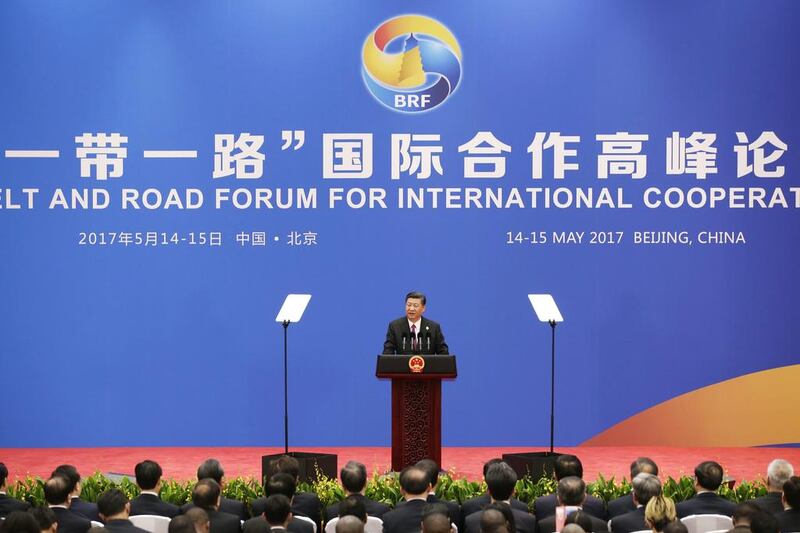BEIJING // The two-day Belt and Road Forum ended in Beijing on Monday with leaders of more than 30 countries agreeing to an action plan on both infrastructure investment and removing trade barriers.
The forum opened up the US$1 trillion Belt and Road Initiative (BRI) to participation by many countries including some western nations.
The event finalised a draft communiqué which pledged to promote “practical cooperation on roads, railways, ports, maritime and inland water transport, aviation, energy pipeline, electricity and telecommunications”.
The meeting saw the BRI transformed from a single-purpose infrastructure programme to a platform for economic diplomacy and trade consultation. The forum attendees agreed to promote a rules-based, open and multilateral trading system with the World Trade Organisation at its core.
“The Belt and Road Initiative originates from China, but it belongs to the world,” Chinese President Xi Jinping told participating representatives of nearly 100 countries and organisations. “The Belt and Road construction spans different regions, development phases and civilisations. It is an open and inclusive cooperation platform.”
The plan involves an estimated $900 billion to be invested in connectivity projects across land and sea. This is the most expensive development plan in history, several times larger than the US Marshall Plan that was used to rebuild Europe after the Second World War, analysts said.
Working jointly with other countries, Mr Xi said, “we will unleash new driving forces for economic growth, and rebalance economic globalisation”.
“We will support cross-border e-commerce and smart city development. We will seek greater complimentary [development] between the Belt and Road Initiative and development plans of different countries,” he said.
Separately, China on Monday signed bilateral agreements with 68 countries on implementing the Belt and Road Initiative, Mr Xi said.
Some critics such as Tokyo have argued that China is pushing through the infrastructure projects to serve its own companies and its own economic goals. However, the United Nations secretary general Antonio Guterres said there was nothing wrong if China did this. “If China will help a country to develop, it is natural it will help itself as well,” Mr Guterres said, adding: “You try to make others rich and also become rich at the same time. If everybody is able to do this, the world will be much different”.
The meeting has agreed to fully implement the economic development program and identified 270 deliverables, Mr Xi said.
Participating countries agreed to cooperate in areas including cross-border industrial zones, joint manufacturing of equipment and other industrial products, and work towards lowering the cost of financing. They also pledged to bring about joint activities in education, science and technology, and media organisations.
Although the joint communiqué was signed by heads of states from 30 countries, representatives of other states that sent lower-ranking officials did not sign as they were not authorised to do so.
Representatives of the US and Germany have emphasised the need to ensure transparency and fair treatment to all countries in the award of construction contracts, and supply of machinery for the construction projects under the BRI. It was not clear what participating western nations have agreed to sign the draft communiqué.
But the forum looks to have propelled China from being the world’s second-biggest economy and the biggest infrastructure builder to a country that can lead economic discourse on a world scale.
"The belt and road is swiftly becoming a measure of China's global standing. The Belt and Road is now the measure that China wants to apply to give it standing in the world," David Kelly, the director of geopolitics at the Beijing-based consulting firm China Policy, told The National.
business@thenational.ae
Follow The National's Business section on Twitter





